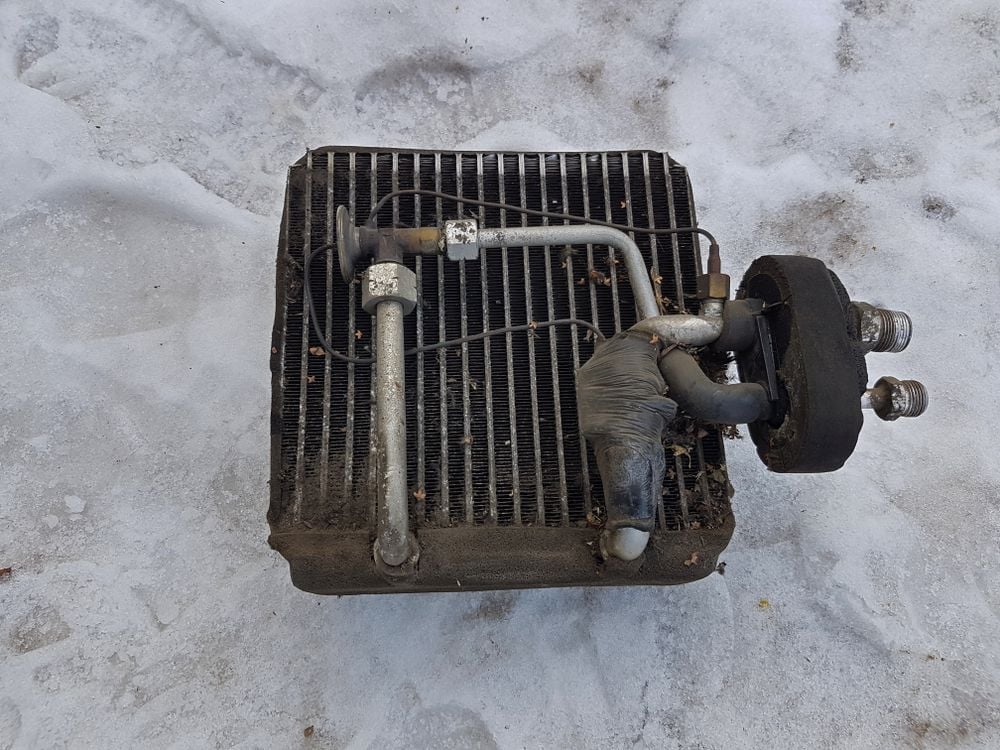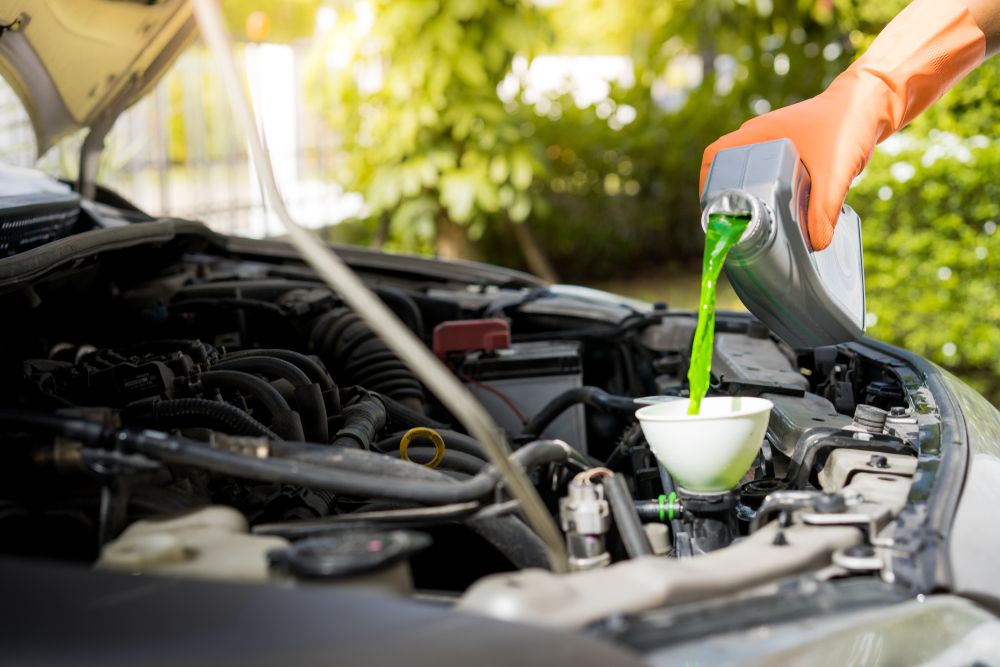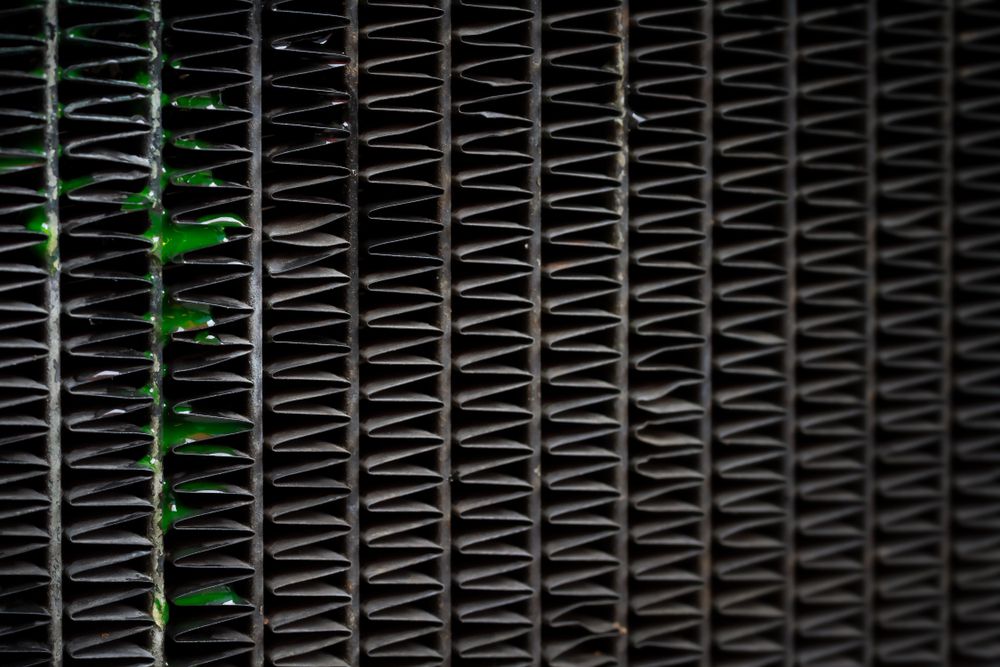
If you noticed that your car smells like antifreeze - with or without a noticeable leak, you might be experiencing a
coolant leak from your radiator, heater core, head gasket, or another cooling system component.
Keep reading to learn what to do in the event of a coolant leak, the cost of repairs, and how to maintain your engine
cooling system safely.
Why Does My Car Smell Like Antifreeze, But It's Not Leaking?
Sometimes, after you turn off your vehicle and exit it, you may notice the obvious smell of coolant - a sweet
chemical scent.
If you smell it but can't detect any visible leak, it may be that a leak is about to occur soon.
At this point, a vehicle is typically still safe to drive and not in need of immediate repairs.
However, you will likely detect a leak sooner or later and need to go to a mechanic.
If you want to find the source of the smell, it may be best to let your engine cool off, then examine the water pump
or coolant valves for signs of antifreeze residue.
 Adding antifreeze to a car
Adding antifreeze to a car
Damaged Heater Core
A damaged heater core will leak coolant and likely result in the classic antifreeze smell in the cabin, especially if
you're using the heater.
It also results in engine overheating in extreme cases.
How Do You Know If Your Heater Core Is Leaking?
The heater core in your vehicle may be leaking if you notice the sweet scent of antifreeze, foggy windows, a rush of
cold air into the car's interior, a problem with the car using up coolant quickly, wet car floors or an overheated engine.
You can detect an overheating problem by checking the gauge on your dash labeled 'H' and 'C.'
If the inside of the car is relatively cool compared to the gauge showing that the engine is hot, the heater core may
be leaking.
 Really old heater core
Really old heater core
Can I Drive With A Leaking Heater Core?
If possible, you should avoid driving with a leaky heater core. A leaky heating core could lead to a low coolant level and overheating problems.
How Do You Fix A Heater Core Leak?
To fix a leaky heater core, you will typically get the part 'sealed' with products that you pour into the radiator
after the engine is turned off and cooled.
These sealants travel to the leak point and form a chemical, weld-like seal to stop the leaking.
How Much Does It Cost To Fix A Heater Core?
A common repair to fix a coolant leak - heater core replacement - costs about $950 on average (roughly $680 for labor
and $270 for parts).
Leaking Ducts
Leaking ducts are a common source of a coolant leak that you'll notice when you are in your vehicle and using the air
conditioning unit.
If you run your AC and notice the sweet smell of coolant from the vents, you may have a coolant leak.
This often indicates a leak spreading to the air inside your car.
You can also identify a leak from your AC ducts if your windows are rolled up and a film starts to collect on their
surface.
What Does Coolant Smell Like
Antifreeze/coolant has a distinctive smell that you'll be able to identify if your vehicle is leaking and/or
experiencing an overheating problem.
Coolant almost always smells slightly sweet due to its chemical makeup, including ethylene glycol.
Some people even compare the smell of antifreeze to maple syrup.
Is Smelling Coolant Harmful?
According to the Centers for Disease Control and Prevention, coolant is not good for breathing (especially when
leaking from your car's interior air ducts) since it can irritate your lungs.
It can also irritate your eyes. However, the substance doesn't typically penetrate the skin, so it's not often
systemically toxic.
Can You Drive A Car That Is Leaking Antifreeze?
Yes, technically, you can drive a car leaking antifreeze, but it's not recommended since it may cause the engine to overheat, which could cause significant engine damage if driven even for a short distance.
The Purpose Of Antifreeze
Antifreeze - also called engine 'coolant' - is designed to keep a vehicle's engine from overheating.
It's a mixture of water and antifreeze. Coolant essentially prevents overheating by regulating the temperature and
keeping it consistent.
Here are the main ways that antifreeze does so:
- It protects against freezing and boiling of the water
- It funnels the engine's combustion heat to the car's radiator so that the radiator can release the engine heat
- It protects against the rusting and corrosion of parts in the cooling system and engine
Tips For Maintaining A Healthy Engine Cooling System
Maintaing a healthy cooling system is easy if your follow a few of our tips.
- Regularly check that the radiator cap is tight
- Periodically check that there is enough coolant in the car
- Flush the system of debris about every 30,000 miles
- Have a mechanic check/clean the radiator at each inspection or sooner
- Check for leaks at the first sign of engine overheating or the smell of antifreeze
Conclusion
Have you ever wondered why does my car smell like antifreeze?
This problem occurs because one or more parts related to your engine cooling system are leaking coolant or faulty.
Be sure to regularly maintain your cooling system and fix a coolant leak at the first sign.
FAQ
What Are The Most Common Places For Coolant To Leak?
Coolant leaks usually occur around the cooling system valves, hoses, gaskets, radiator, and ducts.
Specifically, the most common place to find a coolant leak is at the hose that runs from the engine to the radiator.
Radiator Leakage/ Cracked Coolant Reservoir
Another common source of a coolant leak is when your radiator leaks. This may occur if you have a cracked coolant
reservoir or other faulty radiator parts.
 Radiator Leak
Radiator Leak
For example, the radiator may leak if the hoses connecting it to the engine are leaking coolant.
Or, you might have a radiator that is completely broken and thus leaking the fluid.
How Do I Know If My Radiator Has A Leak?
It's pretty easy to tell if your car's radiator has a coolant leak because you'll notice a fluid residue.
First, examine the radiator cap and see if coolant has leaked and/or stained that area.
Then, examine the hoses connecting to the radiator and see if there is coolant residue or possible cracks.
Faulty Radiator Cap
A faulty radiator cap is going to be a source of a coolant leak because the cap is what keeps the fluid inside of the
part.
The cap is a tight seal that maintains the pressure within the car's cooling system, and when broken, the pressure
will be out of whack, causing coolant to slip out.
Another sign of a faulty radiator cap is if the engine is overheating.
Leaky Head Gasket
The head gasket is another vital component under the hood that keeps the coolant flowing properly.
It's a strong (and expensive) seal that may leak coolant if broken.
What Are The First Signs Of A Blown Head Gasket?
If you have a broken or 'blown' head gasket, you may first notice that you smell or see a coolant leak.
You might also experience:
How Much Does It Cost To Fix A Coolant Leak?
The cost to fix a coolant leak depends on which faulty part of the car is the source of the leak:
- The average price to replace a head gasket is $1,485
- The average cost to replace a radiator hose is $360
- The average cost to replace a radiator cap is $30
- The average price to replace a radiator is $530